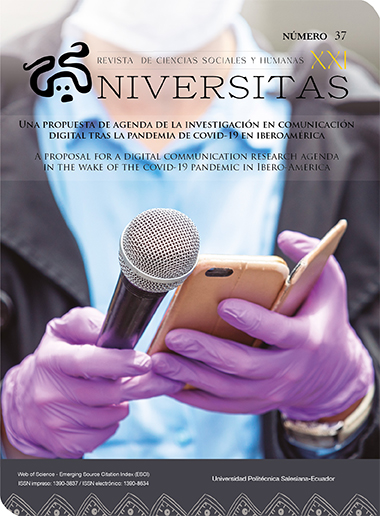Did Covid-19 infect the news? How journalists, audiences and production processes have changed due to the pandemic
Main Article Content
Abstract
Article Details
Universitas-XXI Journal aligns with the principles of open access and academic collaboration by adopting the Creative Commons Attribution-NonCommercial-ShareAlike 4.0 International License (CC BY-NC-SA 4.0). This license ensures that published content can be used and shared widely under the following conditions:
Attribution: Authors and the journal must be appropriately credited as the original creators of the content, with full reference and a link to the publication provided.
Non-commercial use: Content may not be used for commercial purposes, preserving its academic and educational intent.
ShareAlike: Derivative works must be distributed under the same terms as this license, promoting the creation of accessible and equitable knowledge.
By implementing this license, the Universitas-XXI Journal strengthens its commitment to disseminating high-quality research, providing free access to knowledge, and fostering a collaborative environment among researchers, educators, and students worldwide.
This decision reflects core values of responsibility, ethics, and transparency in academia, ensuring that intellectual contributions serve as a foundation for new research and projects while respecting the rights of authors and the scientific community.
For more information about this license, please visit the following link: https://creativecommons.org/licenses/by-nc-sa/4.0/"
References
Survey available at https://docs.google.com/forms/d/e/1FAIpQLScMwxkD-UvSbulCX_AtKIZA-vrlj0JlkUkXEKi4sFZ5M1UhVQ/closedform. Some results were published on “Portal dos Jornalistas” (Brazil) at https://www.portaldosjornalistas.com.br/o-coronavirus-e-os-veiculos-de-comunicacao-xviii/?fbclid=IwAR3knGT6wBzgL3uB6MhFzahogZBD3ViNsgx8aM7RZah3vOxQRDcd-nSt-_k. See more details in section 5.
According to the Moral Foundations Theory, narratives may contain foundations that relate to moral choices of individuals, thereby causing engagement, such as: (1) care / harm (concern for the suffering of others); (2) fairness / cheating (preference for reciprocity and fairness); (3) loyalty / betrayal (concern for the common good and prejudice against strangers); (4) authority / subversion (reference to domination and hierarchy); (5) sanctity / degradation (concern for purity); and (6) liberty / oppression (feelings of restraint and resentment towards those who dominate and restrain their liberty) (Graham et al., 2013).
Published in:https://docs.google.com/forms/d/e/1FAIpQLScMwxkD-UvSbulCX_AtKIZA-vrlj0JlkUkXEKi4sFZ5M1UhVQ/closedform
Respectively, 121 journalists from press, 119 journalists from general media and 107 news consumers that are not journalists.
In this sense, in Portugal, the Sindicato de Jornalistas and Sindicato de Professores (Union of Journalists and Union of Teachers) have been developing a teacher-oriented training in the field of Education for Media, in several Portuguese cities. The purpose is to empower teachers to develop activities on Education for Media, following a project methodology and integrating students and other members from the school and educational communities. The trainers will be journalists and academic experts in the area of journalism who will address concepts related to media and journalism, based on analysis and discussions of international studies, connecting them to the exploration of pedagogical resources, in order to create and develop Education for Media projects, in the schools where the trainees perform their duties. In 2017, the Brazilian Ministry of Education approved the Base Nacional Comum Curricular (National Curricular Common Base), which included a critical reflection on media consumption and production in basic education, with the purpose of systematising discussions that already integrated disperse initiatives at different levels of formal and non-formal education in the country (Pegurer-Caprino; Martínez-Cerdá, 2016). In addition, several media outlets and information verifiers, such as Agência Lupa, offer teaching courses and materials that allow the public to adopt journalism verification practices in their daily lives (Paganotti, 2018). Recently, new media education initiatives started offering teaching materials through massive online courses for a broader audience, such as the “Vaza, Falsiane!” course (Paganotti et al., 2019).

